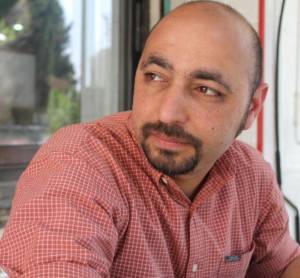My relationship with Joni Mitchell and her music moves through two stages. My early admiration for her—in the seventies—in some ways anticipated the zeitgeist. Then I stopped listening to her for about a quarter of a century. I began to rediscover Mitchell’s work in the new millennium, when, by coincidence, so was the rest of the world.
Essays
Bhel Puri
From the kitchen of Chef Jehangir Mehta
Bhel puri, a savory Indian snack or chaat, is a Bombay original.
Serves 15 people.
Pomfret Chutney Masala
From the kitchen of Bijoya Chaudhuri
Handed down to her son, Amit Chaudhuri
Author’s note: I grew up in Bombay on my mother’s magnificent
version of East Bengali food, a cuisine reinterpreted and perfected—and often
added to with original recipes—by my grandmother in Sylhet and then my
mother in her decades in Bombay. The recipe below is included in my mother’s
Bengali cookbook, published in Calcutta in 2010, and translated recently by
Chitralekha Basu. But this is not a dish that represents East Bengali food; it
comes out of our contact with Bombay, and is not only my mother’s version of
a well-known Parsi dish: it is her response to my craving for it. Its main feature
is the chutney in its name, made with coriander and mint leaves and coconut
pulp: the seaweed-green condiment is one of the most delicious to be found in
the Konkan region, imported, here by the Parsis, and then by an East Bengali.
Mom’s Dal
From the kitchen of Nirmala Swamidoss McConigley
Handed down to her daughter, Nina McConigley
Dal
1 cup of red lentils (washed well)
3–4 cups water
2 tbsp oil
1 onion
6–7 cloves garlic (cut in two)
1/4 tsp asafetida (sometimes called hing), you get this at Indian stores
1/4 tsp turmeric
Jalapeño
1 tomato (add at the end)
Salt to taste
Fresh cilantro for garnish
Papad
By SUKETU MEHTA
Papad was the bard of the masses. He sat during the endless school classes
on the bench next to me, composing rhymes which could be appreciated by
all for their elemental simplicity. Thus:
O dear
Come near
Don’t fear
Have cheer
Beer is here
The Kindness of Strangers
By NONITA KALRA
I am constantly asked why I persist in calling my city Bombay when it has long been renamed Mumbai. A rather articulate but annoying French academic even attributed inherent anarchy to my dissension. “If everyone called cities by the names they preferred, how would anyone know where they are?” I opted out of the argument. I would know. I would always know. With my eyes wide shut. Mumbai may be a zip code, but Bombay is my home.
Chart Showing the Ratio of Church Accommodation to the Population Over 10 Years of Age

We were on the small roads that sometimes turn gravel, sometimes dead end, when we found it. This was Vermont, about ten years ago, our first road trip together: a circuit of swimming holes, picnics, and stops for general store ice cream. We passed a series of “Take Back Vermont” signs. Somewhere along the way we came upon the man, who by all appearances seemed to be a Hare Krishna devotee, having a yard sale. It was here in the sunny warm greenness that we found THE PEOPLE’S CYCLOPEDIA OF UNIVERSAL KNOWLEDGE, WITH NUMEROUS APPENDIXES INVALUABLE FOR REFERENCE IN ALL DEPARTMENTS OF INDUSTRIAL LIFE. BROUGHT DOWN TO THE YEAR 1885.
“New” Arabic Writing: Cataclysm in Fast-Forward

One might ask: “What is this ‘new’ writing in the Arab World?”
Is it a “new generation” of writers? Is it an unprecedented form of writing? The new writing that this essay wants to explore has nothing to do with the age of the writer, nor does it claim that “new writing” suddenly dropped—rootless and without precursors—into the vast space of literature. Rather, “new” writing is an evolution in the techniques of the literary form; in the themes and subjects that correspond with societal change in “real-time”; and in the relationship between the writer, the “cultural authority,” and the official cultural sphere designated by governments and institutions. “New” Arabic writing is also the result of a struggle between the writer and his exploding surroundings.
Early Spring in the Indiana Dunes
The Indiana Dunes National Lakeshore stretches along the southern tip of Lake Michigan in sixteen separate pieces—jagged, sharp-cornered patches of land that float in an industrial landscape of rail lines, factories, and tiny dilapidated homes. The official National Parks visitors’ map includes not just the usual hiking trails and bike paths, but also two steel mills, an electric company, and the machine-gutted inlets that make up the port of Indiana.
About a year ago, on a gray day in March, my girlfriend and I drove here from Chicago, where she lived then and where I was visiting for a long weekend. Winter was melting, but it was cold by the water, the air heavy with evaporated snowmelt, the lake’s presence radiating toward us even before we could see the flare of blue rising above the mounds of the red silt. It was a lonely place. Except for an older woman sitting by herself on a blanket, staring solemnly into the distance, the beach was empty.
Another Version: A Semi-Daily Practice

Around this table we’d gather, cover it with food. In the end: scattered drippings and crumbs, bottles and glasses emptied or abandoned. A cat scavenging the remains.








